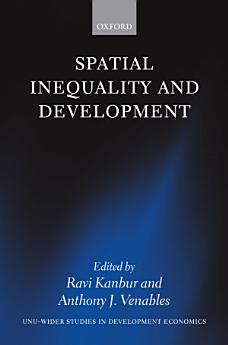Spatial Inequality and Development
Ravi Kanbur · Anthony J. Venables
fbl 2005 · OUP Oxford
5,0star
1 avisreport
E-book
440
Pages
family_home
Éligible
info
reportLes notes et avis ne sont pas vérifiés. En savoir plus
À propos de cet e-book
What exactly is spatial inequality? Why does it matter? And what should be the policy response to it? These questions have become important in recent years as the spatial dimensions of inequality have begun to attract considerable policy interest. In China, Russia, India, Mexico, and South Africa, as well as most other developing and transition economies, spatial and regional inequality - of economic activity, incomes, and social indicators - is on the increase. Spatial inequality is a dimension of overall inequality, but it has added significance when spatial and regional divisions align with political and ethnic tensions to undermine social and political stability. Also important in the policy debate is a perceived sense that increasing internal spatial inequality is related to greater openness of economies, and to globalization in general. Despite these important concerns, there is remarkably little systematic documentation of what has happened to spatial and regional inequality over the last twenty years. Correspondingly, there is insufficient understanding of the determinants of internal spatial inequality. This volume attempts to answer the questions posed above, drawing on data from twenty-five countries from all regions of the world. They bring together perspectives and expertise in development economics and in economic geography and form a well-researched introduction to an area of growing analytical and policy importance.
Notes et avis
5,0
1 avis
À propos de l'auteur
Ravi Kanbur is T.H. Lee Professor of World Affairs and Professor of Economics at Cornell University and has been Professor of Economics at the University of Warwick and Chief Economist for Africa at the World Bank. Anthony J. Venables is Professor of International Economics at the London School of Economics and has been Professor of Economics at the University of Southampton and Trade Research Manager at the World Bank.
Donner une note à cet e-book
Dites-nous ce que vous en pensez.
Informations sur la lecture
Smartphones et tablettes
Installez l'application Google Play Livres pour Android et iPad ou iPhone. Elle se synchronise automatiquement avec votre compte et vous permet de lire des livres en ligne ou hors connexion, où que vous soyez.
Ordinateurs portables et de bureau
Vous pouvez écouter les livres audio achetés sur Google Play à l'aide du navigateur Web de votre ordinateur.
Liseuses et autres appareils
Pour lire sur des appareils e-Ink, comme les liseuses Kobo, vous devez télécharger un fichier et le transférer sur l'appareil en question. Suivez les instructions détaillées du Centre d'aide pour transférer les fichiers sur les liseuses compatibles.







